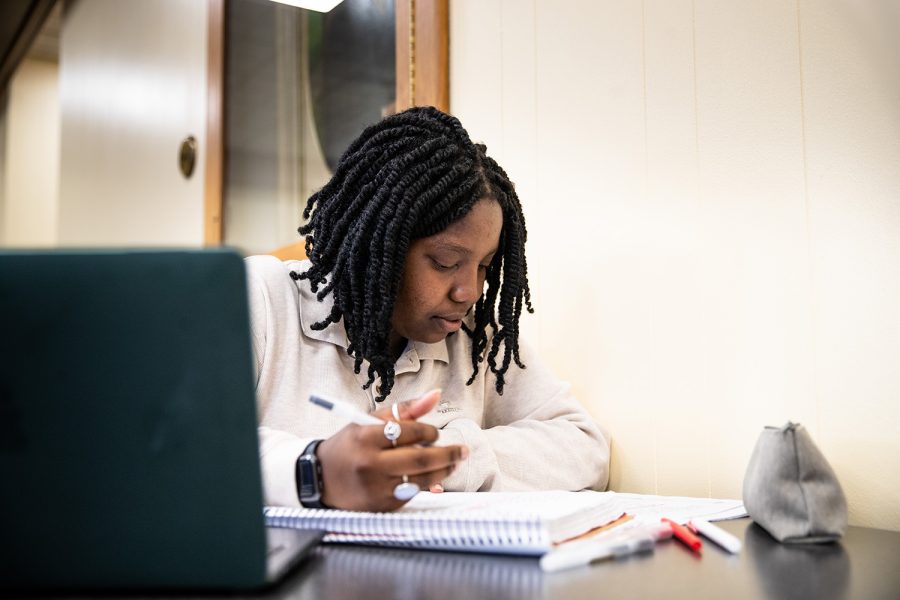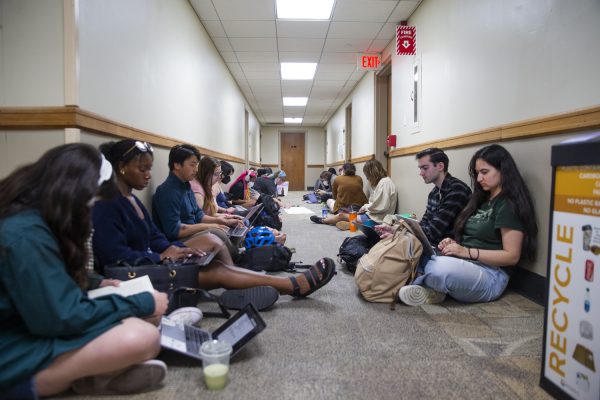UI critical race theory course remains after ‘divisive concepts’ ban
While requiring the teaching of divisive concepts is banned in Iowa, the University of Iowa can continue educating on various topics related to race.
University of Iowa freshman Volta Adovor studies at Rienow Hall at the University of Iowa on Thursday, May 5, 2022. Adovor, along with two other students in high school, were supposed to present “What We Need Our Teachers to Know About Race” at a conference hosted by the Iowa Department of Education in April of last year, but a bill that banned the teaching of divisive concepts from Iowa’s state agencies and schools postponed the event indefinitely. (Gabby Drees/The Daily Iowan)
May 5, 2022
After Iowa Gov. Kim Reynolds signed a bill in June 2021 outlawing the required teaching of divisive topics, the University of Iowa English department is offering a course focusing on the major theories of race and ethnicity in a global context.
House File 802, framed as a law targeting critical race theory by the governor, states that public postsecondary educational institutions cannot provide mandatory training to people that includes nine “divisive concepts.” The law allows for teaching those defined concepts as part of a larger academic course.
- The idea that one race or sex is superior to another race or sex, and teaching that an individual race or sex is inherently racist, sexist, or oppressive is prohibited.
- Teaching that the United States and Iowa are fundamentally or systemically racist or sexist is prohibited.
- Discrimination or adverse treatment of an individual because of their race or sex, and race or sex scapegoating and stereotyping is prohibited.
- Members of one race should not attempt to treat others without respect based on race or sex.
- The idea that an individual’s morals are determined by race or sex and that traits like “hard work ethic” are racist or sexist is prohibited.
The UI has a class offered in the English department titled, Identity and Social Issues: Critical Race Theory.
Loren Glass, chair of the UI English department and president of the UI chapter of the American Association of University Professors, said while the law prohibits the requirement of education on critical race theory, the university’s classes around the topics are optional, making it legal and appropriate.
“We teach all sorts of classes around race and race relations in the United States and in the world, and critical race theory is entirely a legitimate component of our curriculum and laws,” Glass said.
The class fits into the UI department of English’s curriculum as the department offers classes on the diversity of American literature, Anglophone literature, and culture more broadly, he said.
“Issues around race and ethnicity, not to mention gender, sexuality, religious identity, class identity, all of these are areas of literary and cultural expression that we feel are very important to teach in a more narrow way,” Glass said.
Critical race theory is a topic that is important for understanding how different identities are configured and expressed in the Anglophone world, he said.
“If the university’s overall mission is to search for knowledge and truth, then this is something that people need to know,” Glass said. “We are committed to working towards a more diverse, accessible, and equitable culture, both individually in the English department and more generally, and teaching courses like this is part of that mission.”
Kathy Lavezzo, a UI English professor, created the class and is teaching its first-ever section. Lavezzo came up with the idea for the class after teaching a graduate seminar that was half medievalist texts and half theories of race and ethnicity, she said.
While the class is called critical race theory, the topics are more about theories of race and ethnicity in general versus scholars doing critical race theory, Lavezzo said.
“The class is about reading critical approaches to race and ethnicity…three or four of our readings are official critical race theory readings, she said. “I picked a lot of texts that highlighted how what we learn in an English department is really valuable for thinking carefully about issues of race and ethnicity.”
Lavezzo said she was surprised there were not more classes focused on thinking critically about race and ethnicity being taught at the UI.
“There’s an interest and it’s 100 percent a wonderful experience,” Lavezzo said. “We’re careful in the class. When we’re reading a sensitive reading and a charged reading, maybe even a triggering reading, we spend about five minutes mulling over do’s and don’ts for discussion. I think those are the sorts of things one needs to do. It’s a great class to teach.”
The course was met with support and excitement from students, Lavezzo said, and she feels it is a great community.
“I would say I’m teaching some of the hardest readings I’ve ever taught, including [readings offered in] graduate courses, and these students are so motivated and passionate that they are reading these pieces very well and making great comments,” she said.
Lavezzo said she is excited to teach the course again in the fall and thinks it is an important topic to educate UI students about.
“Identity is central to the way all of us live, and issues of race and ethnicity apply to all of us, all of our identities,” she said. “It’s just crucial to thinking about living in the world and understanding the world.”
Volta Adovor, a UI first-year student, said she hasn’t discussed critical race theory in any of her classes. Adovor is taking mostly general education and science courses, but there have been moments where it could have been addressed, she said.
Adovor said there were multiple times in her disabilities in global writing and film course where critical race theory and culture could have been talked about, but it was not.
“I thought there would be a lot more about intersectionality because we’re talking about global issues as far as disabilities go,” she said. “There were a lot of times where [the professor] could have addressed intersectionality and how culture plays a role in how [people] are treated and she completely missed over it.”
The cultural aspect not being addressed upset Adovor, she said, but she did not want to speak up because she is a first-year student and did not want to overstep boundaries.
When cultural and racial aspects and influences are not addressed in classes, other students can leave with misconstrued ideas about groups of people or reinforced stereotypes, Adovor said.
“There was no looking at the actual culture in the area to see why they treat people with disabilities or what did they do,” she said. “Then you get students who are like…in this country, they hate people with disabilities, but that’s actually not the case. You’re getting the one-sided perspective from an American point of view.”
Lectures around the topic have taken place on campus before, such as “What Is Critical Race Theory?: Perspectives from Business, Law, & Sociology” in September 2021. Adovor said while it is great that there are lectures for people to attend, the topic being integrated into classes would be better because every student would have an opportunity to learn.
“If you could put it in spaces where it already has room to exist, I think that would be a lot better than having it be a separate class,” she said. “When you separate it, it’s like, ‘Hey, there’s this [class]over there.’ People have the option to not go over there and go learn about it.”
Overall, while she wishes the topic was already talked about in all classes, Adovor said she is excited about the course and the conversations it is able to spark about critical race theory.
Adovor said it is important to remember critical race theory is still a topic that is being discussed for the first time by some students.
“You have to understand this is a safe space, that people are wanting to bring their ideas out there,” Adovor said. “We have to respect that and understand that everyone does come from different places, so maybe their ideas might be a little different.”
Editor’s note: A previous version of this article misstated how House File 802 applies to academic instruction. The error has been corrected.















